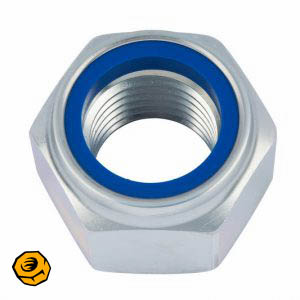What is a Nylon Insert Lock Nut?
A Nyloc (nylon insert lock nuts) Nut is a torque prevailing nut that uses a plastic/nylon insert located towards the top of the nut, reducing its inner diameter, which then deforms over the mating thread. This captures the bolt or screw, providing a locking feature causing resistance or prevailing torque – keeping the nut locked in position and resistant to vibration.
This design feature means that the screw threads do not cause damage to the plastic/nylon section allowing the nut to be re-used – although the locking feature will deteriorate after persistent re-use.
The Nyloc nut is an economic locking nut and ideal in applications where vibration or motion could loosen or undo the nut.
The nut can also be used to assist in sealing the bolt thread against seepage of oil, water, petrol, paraffin, and other liquids.
Different terms for Nylon Insert Lock Nuts
- Nyloc nut
- Nylock nut (Misspelt)
- Nylon insert lock nut
- Polymer-insert lock nut
- Elastic stop nut
How do Nyloc Nuts Work?
The nylon insert locknut comes with an insert that fits the threads of the screw it is placed on and causes a gripping action due to the friction it creates. This, in turn, lessens the chance that the nut will become loose because of vibrations.
Although the name nylon insert locknut creates the impression that they actually lock, they do not. Depending on the amount of vibration in the application that the locknut is used for, the parts may become loose, but they will not come apart because of the friction that results between the locknut and the threads.
Installation Tips.
Thread the nylon lock nut onto the bolt or threaded stud and turn the nut clockwise with your hand until it no longer turns. This will be the point that the nylon insert contacts the top thread of the fastener.
Place the socket that matches the nylon lock nut onto the 3/8-inch drive ratchet.
Slide the socket onto the nylon insert lock nut and turn the handle of the ratchet clockwise to turn the nylon insert lock nut onto the fastener. You will feel some resistance from the nylon insert lock nut as you turn it onto the fastener. This is created by the nylon insert and is completely normal.
Continue turning the ratchet handle until the nylon insert lock nut seats tightly against the surface of the material you are securing with the nut.
Inspect the nylon insert of the lock nut to ensure that it is intact after installation.
Uses of Nylon Insert Lock Nuts
Nylon Insert Lock Nuts are generally the first choice for general use as they provide good resistance to loosening due to vibration or flexing of the joint and will stay in position on a thread even when not under tension (unlike spring washers). Unlike locking adhesives they can be removed and adjusted without losing their locking properties and can, to some extent be reused.
They can be used in environments with relatively high temperatures where they can retain their locking ability up to 121°C.
All Nyloc Nuts should be used with a lubricant such as Nickel Anti-Seize to prevent ‘Galling’.
Industries that use Nyloc Nuts
- Storage Racks
- Power Distribution
- Pumps & Valves
- Chemical
- Automotive
- Industrial Automation
- Electrical Assemblies
- Robotics.
- Engineering Industries.
Can Nyloc Nuts Be Reused?
Although these round objects can be reused in several applications still it’s recommended to go for fresh nuts, especially in case of critical fastener connections. Even the slightest risk of failure can slap manufacturers with a ban on the usage of old locked nuts in all critical applications, including rod bolts, cylinder head bolts, and bearing cap bolts. The advanced nylon formulas easily enable the nyloc nuts to be applied in various internal engine applications without concern.
Did you know?
The metric nyloc nuts can maintain their locking ability even at 250°F (121 °C) and that ‘Nyloc’ is a registered trade name of Forest Fasteners. In Australia, it is a registered trademark of Exafast Pty Ltd.
Know more at Wikipedia

